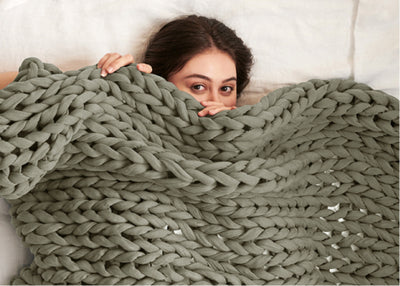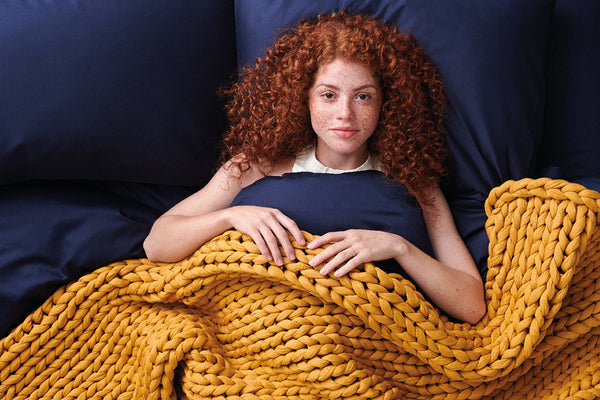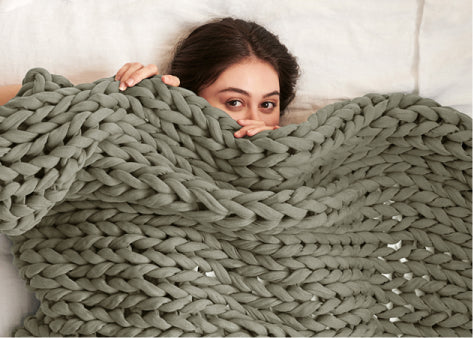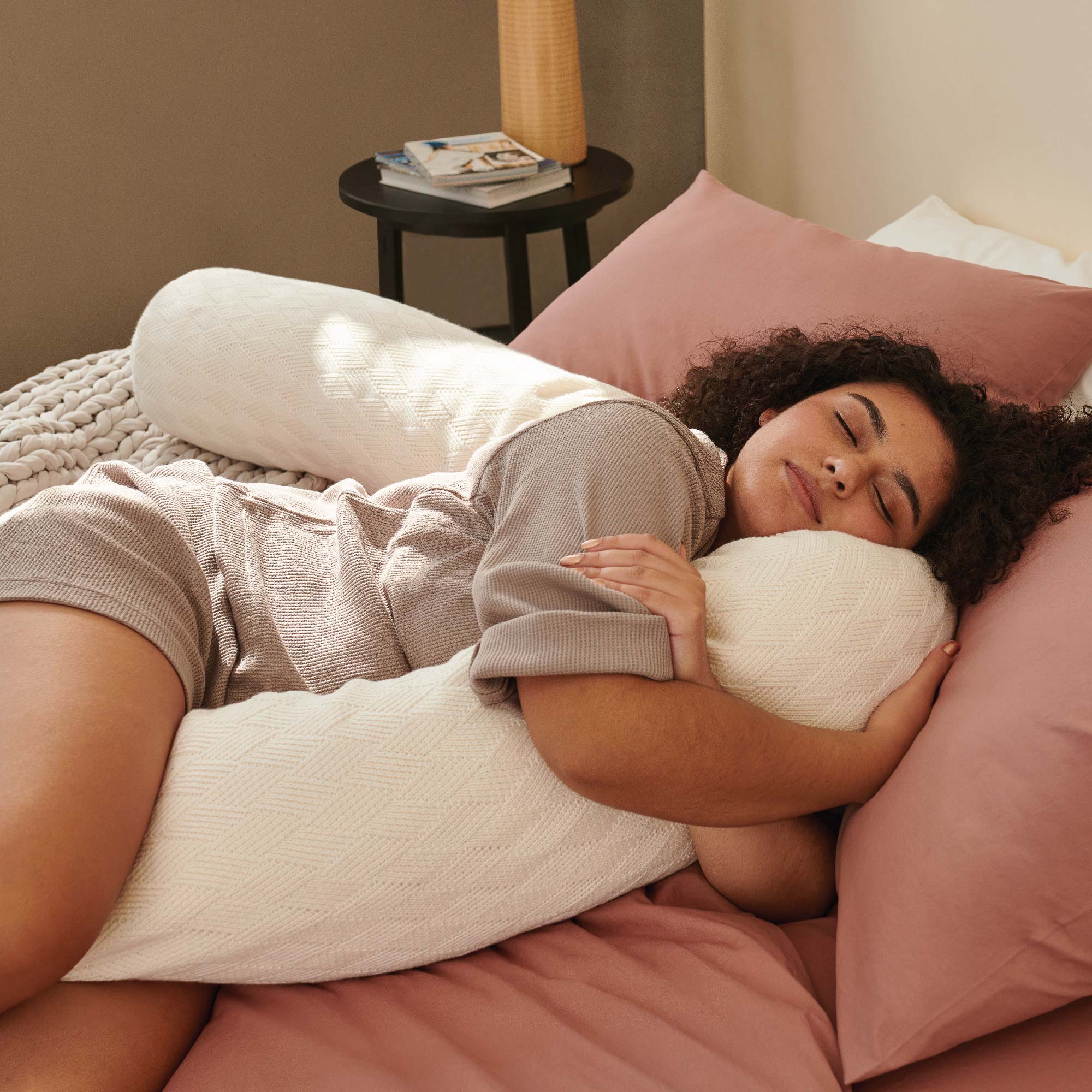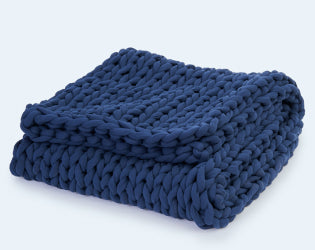Pain and numbness in the arms and hands while sleeping is the result of the compression of nerves in your body. This often occurs when your limbs get bent and pressed into awkward positions while you’re asleep. There are also many medical conditions that can make pins and needles more likely.
Bearassentials
The median, ulnar, and radial nerves supply sensation from the elbow to the fingertips.
These nerves can get compressed during sleep, leading to a loss of sensation. Underlying conditions like diabetes can make things worse.
Sleeping on your side and using wrist braces may help prevent pins and needles.
Did you know?
It’s possible to experience sensations of pain even in limbs that are no longer there. The phenomenon is called ‘phantom pain’ and has to do with nerve endings continuing to operate after amputation.
Do you sometimes wake up with no feeling in your limbs only to feel a burning sensation as they come back to life? Worried that it’s happening too often?
Pain and numbness in arms and hands while sleeping is often a harmless case of nerves being pressed down while in bed. However, there are some more serious potential triggers.
If you frequently experience pins and needles while sleeping, you may want to look into why. You may also be able to fix it with a tweak to your sleeping habits.
1. Why Do My Arms Go Numb When I Sleep?2. Why Do I Have Hand Pain At Night While Sleeping?3. Why Do I Feel Tingling In My Left Arm?4. Medical Conditions That Can Lead To Arm And Hand Numbness At Night4.1. Diabetes4.2. Alcoholism4.3. Carpal Tunnel Syndrome4.4. Cubital Tunnel Syndrome4.5. Cervical Spondylosis4.6. Bodily Injuries5. How To Reduce Numbness In Your Hands When Sleeping5.1. Avoid Sleeping On Your Stomach5.2. Use A Body Pillow To Stay On Your Side6. Wear A Wrist Brace To Bed7. Conclusion8. FAQs8.1. Why Do I Feel Numbness In My Left Arm When Sleeping?8.2. Why Do My Hands Go Numb While Sleeping?8.3. Why Am I Waking Up With Numb Hands After Sleeping?8.4. Why Do I Feel Tingling In My Left Arm From My Elbow To The Hand?8.5. What Could Cause Tingling In The Right Hand And Arm?8.6. My Body Feels Uncomfortable When Trying To Sleep, Why?
Why Do My Arms Go Numb When I Sleep?
Are you feeling numbness in your hands while sleeping? Do your hands fall asleep at night when you lay down in bed? Well, there’s a reasonable explanation on why this happens.
Most healthy arms have nerves that allow you to feel, and if your arms go numb when you sleep, it’s because something is blocking those nerves from communicating with the rest of the limb. A handful of medical conditions and poor sleep posture are the main culprits that could be responsible.
If you’re out of position, your arm and wrist can get bent out of shape during the night, leaving your nerves compressed and your arm feeling lifeless. Here are the three main nerves and what they affect:
- Median. Responsible for three-quarters of the sensation in the palm of the hand from the thumb to the ring finger. Also gives feeling to the back side of those fingertips.
- Ulnar. Supplies feeling to the front and back side of the pinky and ring finger side of the hand.
- Radial. Responsible for sensation from the back of the arm all the way down to the back of the hand and thumb.

Why Do I Have Hand Pain At Night While Sleeping?
If you have hand pain at night while sleeping, it may be related to compression of the same nerve endings that lead to numbness. As the feeling comes back, there can be uncomfortable pins and pricks.
However, more serious and chronic pain may be explained by damaged nerves.
The condition is known as neuropathic pain, and an estimated 7-10% of the population experiences it.
Nervous system diseases like shingles are famous examples of conditions that can lead to neuropathic pain, but there are some more common ones, too.
Why Do I Feel Tingling In My Left Arm?
Feeling tingling in your left arm can have various causes, and it's essential to pay attention to your body. Here are a few common reasons for this sensation:
1. Poor Circulation: Reduced blood flow to the arm, often due to sitting or sleeping in an awkward position, can cause tingling.
2. Nerve Compression: Pressure on the nerves in your neck or arm can lead to tingling. This might result from holding your arm in an unusual position as you sleep.
3. Pinched Nerve: A pinched nerve in the neck or shoulder can radiate tingling sensations down the arm.
4. Anxiety or Stress: Sometimes, stress and anxiety can lead to physical symptoms like tingling in the arm.
5. Medical Conditions: Underlying medical conditions like carpal tunnel syndrome, diabetes, or heart issues can cause tingling sensations.
Medical Conditions That Can Lead To Arm And Hand Numbness At Night
If you wake up every now and then with numbness followed by slight pain, it might not be a serious problem.
However, there are many medical conditions that can make these symptoms more frequent.
Diabetes
One side effect of diabetes that doesn’t get a lot of airtime is the fact that high blood glucose levels can have consequences for your nerves. That, along with high fat levels, can lead to nerve and blood vessel damage, which may in turn lead to numbness in your hands while sleeping.
Alcoholism
Another disease that has a bad relationship with diabetes is alcoholism. As a drug that affects the central nervous system, alcohol can have strong impacts on sensations in your limbs, and chronic overdrinking may result in numbness or pain during the night.
Carpal Tunnel Syndrome
Attention all keyboard warriors, gamers, and anyone else who puts frequent strain on their wrists. Stress on that part of the body can lead to carpal tunnel syndrome down the road, a condition that causes numbness and pain by blocking the median nerve. It also often leaves people waking up with numb hands.
Cubital Tunnel Syndrome
On the opposite side of the hand – the pinky and ring finger side – we have the Ulnar nerve. Overuse on that side of the hand could lead to the lesser known cubital tunnel syndrome. The symptoms are the same as its carpal tunnel cousin, only on the other side of your hand.
Cervical Spondylosis
Do you sit with your neck craned at a screen all day? Make repetitive movements as part of a manual labor job? This can lead to unwanted friction in the cervical spine – the upper bit where the nerves in the arm connect. Too much wear and tear in that part of the body can lead to tingling in your fingers and hands at night.
Bodily Injuries
If it’s not wear and tear over a long period of time, sudden trauma could be the cause of the night time numbness. Broken arms, damage to your upper back, or even certain overuse injuries could lead to nerve damage down the line.
How To Reduce Numbness In Your Hands When Sleeping
If you find yourself waking up with numb fingers or arms on a consistent basis and are concerned, seeing a doctor should be the first action you take.
For those who experience this feeling irregularly and want to see if adjustments make a difference, you can try a few of the tips here.
Avoid Sleeping On Your Stomach
Lying on your hands or arms while you sleep is a surefire way to end up numb. And avoiding lifeless limbs is just one of many reasons to stay off your stomach while you sleep. So if this is a position you frequently find yourself in throughout the night, you may want to start sleeping on your back or side.
Use A Body Pillow To Stay On Your Side
If stomach sleeping is public enemy number one for the nerves in your arms, their best buddy is side sleeping. Studies show side sleeping is the best position for preventing numb limbs as pressure is more evenly spread across the body.
If you’re someone who struggles to sleep on your side, you may want to try switching up your pillow of choice. A body pillow is a good support option for many side sleepers, since it can keep you in position throughout the night while relieving pressure.
Our body pillow might be a good option if you’re looking for a soothing pillow made from all-natural, organic materials.
Wear A Wrist Brace To Bed
If you suspect that you have carpal tunnel or cubital tunnel syndrome, a brace may be exactly what you need to avoid numbness. They help by preventing your wrist from getting bent out of shape, alleviating pressure from the median and ulnar nerves. Just make sure that you choose one comfortable enough to sleep with.
Conclusion
If you frequently notice pain or numbness in your arms and hands while sleeping, it could be because an underlying condition is compressing the nerves in your arm. Supporting yourself in a side-sleeping position with a body pillow like the Cuddler or using braces may help keep the pressure off.
Pins and needles in the middle of the night stem from nerves not being able to send the right signals, and often changing sleep positions can help you on your way to pain-free wakeup.
FAQs
Why Do I Feel Numbness In My Left Arm When Sleeping?
Feeling numbness in your left arm while sleeping can be attributed to various factors. One common reason is poor sleeping posture, where you might unknowingly compress the nerves in your arm by sleeping in an awkward position.
It's also possible that reduced blood flow due to pressure on your arm is causing the numbness. In some cases, underlying medical conditions like carpal tunnel syndrome or nerve compression issues could be at play.
Why Do My Hands Go Numb While Sleeping?
The most frequent reason is compression of the nerves in your hands due to an awkward sleeping position. This compression restricts blood flow and results in numbness. Poor sleeping posture, like sleeping with your hand under your head or body, can contribute to this.
Why Am I Waking Up With Numb Hands After Sleeping?
One of the most common causes for this is sleeping with your wrist in an awkward or bent position, which can compress the nerves and lead to numbness. This is often associated with a sleeping posture that places pressure on the hands or wrists. Additionally, underlying conditions such as carpal tunnel syndrome, arthritis, or even poor circulation can contribute to waking up with numb hands.
Why Do I Feel Tingling In My Left Arm From My Elbow To The Hand?
This could be due to pressure or compression on the ulnar nerve, often referred to as the "funny bone" nerve, which can happen if you lean on your elbow or sleep in a position that puts weight on it. Another potential reason is poor circulation, which can lead to temporary tingling.
What Could Cause Tingling In The Right Hand And Arm?
Aside from pressure and compression, this sensation can be caused by nerve issues, such as a pinched nerve in the neck or shoulder. Conditions like carpal tunnel syndrome, where the median nerve in the wrist is compressed, can also lead to tingling. Additionally, medical conditions like diabetes, vitamin deficiencies, or even certain medications can contribute to these sensations.
My Body Feels Uncomfortable When Trying To Sleep, Why?
This could be related to your sleep environment, like an uncomfortable mattress or pillow, excessive noise, or room temperature. Stress and anxiety can also play a significant role, making it challenging to relax and fall asleep comfortably. Certain medical conditions, such as acid reflux, restless leg syndrome, or sleep apnea, may contribute to sleep discomfort as well.
It's essential to address the root cause of your discomfort to improve your sleep quality. Practising relaxation techniques, maintaining a cool and dark sleep environment, and using sleep aids like our Cotton Napper weighted blankets are all steps that can help you achieve a more restful night's sleep.

